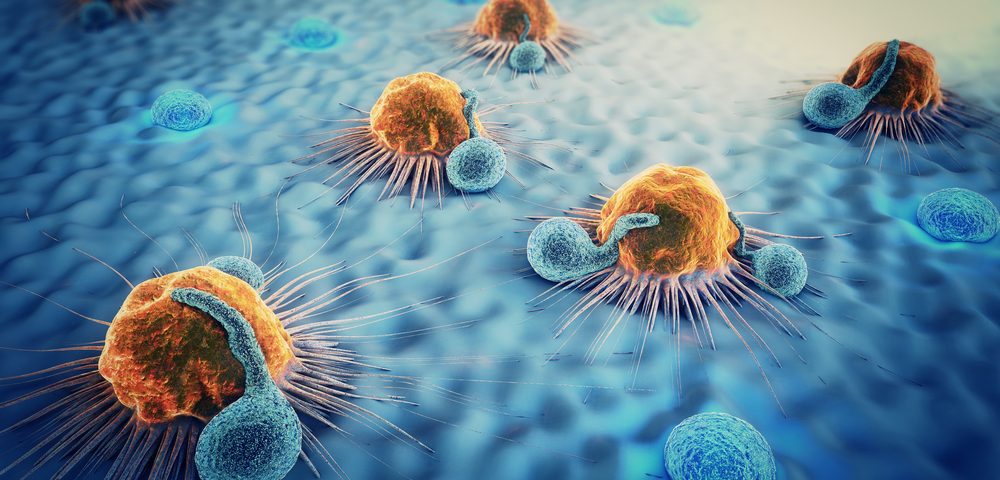Patients with hereditary melanoma associated with mutations in the CDKN2A gene respond well to immunotherapy, possible due to an increased mutational load in these tumors, a study suggests.
The study, “Efficacy of novel immunotherapy regimens in patients with metastatic melanoma with germline CDKN2A mutations,” was published in the Journal of Medical Genetics.
People with inherited mutations in the CDKN2A gene — which has the instructions to produce two proteins involved in the suppression of tumor development — have a more than 65 times higher risk of developing melanoma.
These mutations are also associated with a high risk of developing several primary melanomas and other types of cancer, and a lower melanoma-specific survival.
So far, no chemotherapy regimen has proven able to prolong the survival of patients with metastatic melanoma (when it has spread to other parts of the body), but immunotherapies — particularly those against PD-1 and CTLA-4 — hold promise for the treatment of this type of tumor.
PD-1 and CTLA-4 are two immune checkpoint proteins involved in natural processes of negative regulation — much like “brakes” — of the immune system. Since their identification — which earned their discoverers the 2018 Nobel Prize in Physiology or Medicine — several antibodies against these molecules have been developed and approved.
This type of immunotherapy works by turning off these immune system “brakes” and boosting the body’s immune response against cancer cells.
While these immunotherapies — including Keytruda (pembrolizumab) and Opdivo (nivolumab) against PD-1, and Yervoy (ipilimumab) against CTLA-4 — are effective in many melanoma patients, there are a considerable number of patients who do not respond to this type of therapy.
Consequently, it is important to understand which type of patients are most likely to respond to these therapies, and to identify the underlying factors that predict treatment responses.
To study this, researchers in Sweden, Italy, Spain, the Netherlands, and Australia evaluated the effectiveness of immunotherapy in patients with inherited CDKN2A mutations and metastatic melanoma.
They reviewed the medical records of patients carrying CDKN2A mutations and enrolled in follow-up studies for hereditary melanoma. They identified 19 patients (10 men and nine women) who had developed metastatic melanoma and received an immunotherapy.
Median age of the patients at the start of treatment was 55 years. Treatments included therapy against PD-1 (eight patients), CTLA-4 (eight patients), or both PD-1 and CTLA-4 (three patients), a triple combination therapy against PD-1 and another two proteins (one patient), and the transfer of specific immune cells to fight cancer (one patient).
The team compared the patients’ responses to treatment with those reported in Phase 3 clinical trials evaluating immunotherapies against PD-1 and/or CTLA-4 in patients with metastatic melanoma.
Of the patients, 11 (58%) responded to immunotherapy, and six (32%) had a complete response to therapy. This was significantly superior to what was reported in previous clinical trials for the fraction of treatment responders (median of 37% of patients) and complete responders (median of 7% of patients).
The proportion of patients carrying CDKN2A mutations who were alive one year (75%) and two years (63%) after starting CTLA-4 immunotherapy was also higher than that reported in clinical trials.
Researchers were unable to calculate the survival rates of patients treated with antibodies against PD-1 at the time of the study because a large number of patients had started treatment less than a year prior.
Next, the researchers compared the mutational load of melanoma tumors with or without CDKN2A mutations, since it has been suggested to be a predictive factor of the tumor’s response to immunotherapy.
Through the analysis of mutational data from 879 melanoma tumors from publicly available data, they found that melanomas with CDKN2A mutations had significantly more mutations than tumors without CDKN2A mutations.
They hypothesized that the substantial accumulation of mutations in these cancer cells may help the immune system to recognize them as foreign and induce stronger anti-tumor immune responses.
“Our conclusion from the study is that CDKN2A mutation carriers with metastatic melanoma have good chances of responding to immunotherapy, which can be associated with the fact that tumours with a CDKN2A mutation seem to have a tendency to accrue even more mutations,” Hildur Helgadottir, MD, PhD, the study’s first author and a researcher at the Karolinska Institutet in Sweden, said in a press release.
The team noted that additional studies are required to confirm these results and clarify the association between CDKN2A mutations, mutational load, and immunotherapy responses, as well as their underlying mechanisms.


